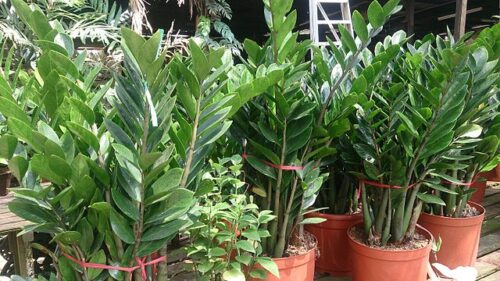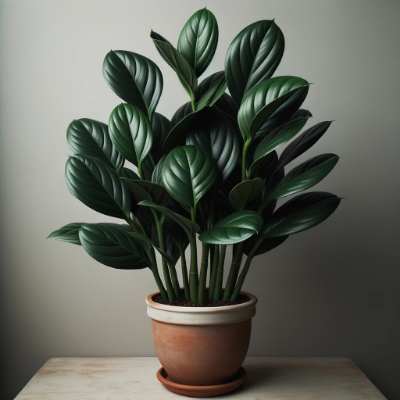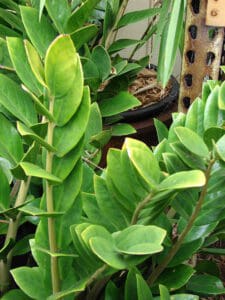ZZ plants symbolize various positive qualities, including prosperity, growth, and resilience. The upward growth of ZZ plant leaves is associated with financial growth and prosperity, making it a popular choice in Feng Shui practices. Placing ZZ plants in the wealth corner of a home or office is believed to attract financial abundance.
ZZ plants, also known as the “Fortune Tree,” carry a rich symbolism deeply rooted in Asian cultures, particularly in Feng Shui and Vastu. In this comprehensive exploration, we delve into the various benefits of choosing a ZZ plant, including its role as a money magnet, easy maintenance, longevity, and its capacity to elevate status. Additionally, we address common concerns about ZZ plants, such as their potential toxicity. We’ll then navigate through the lens of Asian Feng Shui, comparing ZZ plants to other significant plants like the Money Tree and Lucky Bamboo. Moving forward, we’ll dissect the essential aspects of ZZ plants, including their botanical characteristics, etymological meaning, and historical roots. The article will also uncover the symbolic meaning of ZZ plants in Feng Shui and their association with zodiac signs. Furthermore, we’ll explore occasions suitable for gifting ZZ plants and answer frequently asked questions about their symbolism and care. Let’s embark on a journey to unravel the mysteries and benefits of ZZ plant symbolism.
The Symbolic Meaning of ZZ Plants
To understand the symbolic meaning of ZZ plants, delving into their essential characteristics and cultural roots is paramount.
About ZZ Plants
ZZ plants, scientifically classified as Zamioculcas zamiifolia, belong to the Araceae family and Zamioculcas genus.
Family, Genus, and Taxonomy
- Family: Araceae
- Genus: Zamioculcas
- Species: Zamiifolia
Etymological Meaning
- Zamioculcas: Derived from the combination of “Zamia” and “Culcas,” reflecting its African origins.
- Zamiifolia: The specific epithet “zamiifolia” means “with leaves resembling those of Zamia,” a type of cycad.
Botanical Characteristics
- Leaf Structure: The ZZ plant features glossy, dark green, pinnate leaves with leaflets arranged along a central stem.
- Growth Pattern: Upright stems with alternate leaflets create a visually striking, bushy appearance.
- Rhizomes: ZZ plants propagate through rhizomes, underground stems that store water, contributing to their resilience.

History & Origins of ZZ Plants
The origins of ZZ plants can be traced back to Eastern Africa, specifically Zanzibar, Tanzania, and Kenya.
Geographic Roots
- Native Habitat: ZZ plants thrive in shaded, low-light conditions, characteristic of their natural habitat in the understory of East African forests.
- Adaptability: The ability to adapt to diverse environments has contributed to the widespread popularity of ZZ plants as houseplants.
Introduction to Horticulture
- Discovery: The plant was discovered by Western botanists in the late 19th century but gained popularity as a houseplant in the 1990s.
- Global Appeal: ZZ plants quickly became a global favorite due to their low-maintenance nature and striking appearance.

The Meaning, Symbolism, and Cultural Significance of ZZ Plants
The symbolic meaning of ZZ plants transcends their botanical characteristics, intertwining with cultural beliefs and practices.
Use in Feng Shui
ZZ plants play a pivotal role in Feng Shui practices, where the arrangement of objects and elements is believed to influence the flow of energy, or “qi.”
Feng Shui Placement
- Wealth Corner: Placing ZZ plants in the southeast corner of a room or the wealth area of a home aligns with Feng Shui principles to attract wealth and prosperity.
- Symbolic Significance: The plant’s lush, upward-growing leaves symbolize growth and positive energy, contributing to a harmonious living space.
Energy Flow
- Positive Energy: ZZ plants are thought to enhance positive energy flow, creating a sense of balance and well-being.
- Removal of Stagnation: In Feng Shui, plants like ZZ contribute to removing stagnant energy, fostering a dynamic and vibrant environment.
ZZ Plants and the Zodiac
The connection between ZZ plants and zodiac signs adds another layer to their symbolic significance.
Compatibility with Zodiac Signs
- Capricorn: ZZ plants are often associated with Capricorns, symbolizing their disciplined and determined nature.
- Taurus: Taurus individuals, known for their practicality and stability, find resonance with the resilient and low-maintenance qualities of ZZ plants.
Recommended Placements
- Capricorn Spaces: Placing ZZ plants in spaces frequented by Capricorns, such as work areas, enhances the positive energy tailored to their zodiac traits.
- Taurus Homes: In Taurus-dominated households, incorporating ZZ plants contributes to a harmonious and stable atmosphere.
Suitable Occasions for Gifting ZZ Plants
Gifting ZZ plants transcends mere gesture; it carries symbolic weight and is suitable for various life occasions.
New Home
Welcoming someone into a new home with a ZZ plant is a gesture that symbolizes growth, prosperity, and a positive start.
Symbolic Gesture
- Upward Growth: The upward growth of the ZZ plant signifies progress and success, making it an ideal gift for someone embarking on a new chapter in their life.
- Longevity: ZZ plants’ resilience and longevity convey wishes for a stable and enduring home environment.
Plant Care Kit
Enhance the gifting experience by including a care kit with instructions, a stylish pot, and a personalized note explaining the symbolic meaning of the ZZ plant.
New Job
Starting a new job is a significant life event, and gifting a ZZ plant can be a thoughtful way to wish someone success and prosperity in their professional journey.
Symbolic Career Growth
- Upward Leaves: The upward growth of the ZZ plant’s leaves symbolizes upward career progression, making it a meaningful gift for someone starting a new job.
- Greenery in the Workplace: Bringing a touch of greenery to the workspace contributes to a positive and vibrant atmosphere, fostering productivity and success.
Personalized Touch
Consider personalizing the gift by choosing a stylish pot or planter that aligns with the recipient’s taste. Including a small note explaining the symbolic meaning of the ZZ plant adds a thoughtful touch, making the gift more meaningful.
After a Breakup
Navigating through a breakup can be challenging, and gifting a ZZ plant can offer solace and symbolize new beginnings.
Healing Symbolism
- Resilience: The ZZ plant’s resilience reflects the recipient’s strength and ability to overcome challenges, providing a sense of hope for the future.
- Fresh Start: Gifting a ZZ plant conveys wishes for a fresh start and the beginning of a new, positive chapter in life.
Care Instructions for Self-Care
In addition to the ZZ plant, providing care instructions can be a gentle reminder for self-care. Encourage the recipient to nurture the plant and, in turn, nurture themselves during the healing process.
Birthdays
Celebrating birthdays with a ZZ plant adds a touch of symbolism and greenery to the occasion, making it a unique and meaningful gift.
Personalized Birthday Wishes
- Birth Month Connection: Consider gifting a ZZ plant based on the recipient’s birth month. Research the specific symbolism associated with that month to add a personalized touch.
- Longevity Wishes: ZZ plants, known for their longevity, convey wishes for a long and prosperous life ahead.
Decorative Elements
Enhance the gift by selecting a decorative pot or planter that complements the recipient’s style. Including a birthday card with a special message adds a personal and heartfelt element to the gift.
What Are The Benefits of Choosing a ZZ Plant?
Choosing a ZZ plant extends beyond mere aesthetics; it’s a decision laden with symbolism and practical advantages.
1. Use As Money Magnet
Embracing the belief in plants as symbols of prosperity, ZZ plants are revered for their role as money magnets in Feng Shui. Placing a ZZ plant strategically in your living space is believed to attract wealth and financial abundance. The rationale behind this lies in the plant’s vibrant and upward-growing leaves, resembling the symbolic representation of upward progress and growth in monetary terms. ZZ plants, when positioned correctly, are thought to stimulate positive energy flow, leading to increased financial opportunities and success.
1.1 Choosing the Right Location
To harness the money-attracting power of a ZZ plant, careful consideration of its placement is crucial. In Feng Shui, the southeast corner of a room or the wealth area of a home is considered the most auspicious location for a money magnet plant. Ensure that the ZZ plant is placed in a well-lit area with indirect sunlight. This strategic positioning aligns with the belief that the plant’s energy radiates effectively, drawing wealth and prosperity into the space.
1.2 Caring for Prosperity
A flourishing ZZ plant is believed to amplify its money-attracting qualities. Regular watering, well-draining soil, and occasional fertilization contribute to the plant’s overall health and vitality. As the plant thrives, so does its symbolic representation of financial prosperity, creating a harmonious connection between the physical and symbolic aspects of wealth.

2. Easy Maintenance
ZZ plants are celebrated not only for their symbolic significance but also for their low-maintenance nature.
2.1 Resilient Nature
One of the standout features of ZZ plants is their resilience. Thriving in low light conditions and tolerating sporadic watering, ZZ plants are an ideal choice for both novice and experienced plant enthusiasts. Their ability to adapt to different environments makes them versatile additions to various spaces, from offices to homes.
2.2 Step-by-Step Care Guide
- Light Requirements: ZZ plants thrive in low to bright, indirect light. Place them in areas with filtered sunlight for optimal growth.
- Watering: Allow the soil to dry out between waterings. Overwatering can lead to root rot, so a measured approach is essential.
- Temperature: ZZ plants prefer temperatures between 65-75°F (18-24°C) and can tolerate slightly cooler conditions.
- Soil: Well-draining soil is crucial to prevent waterlogging. Use a mix of potting soil and perlite for adequate drainage.
2.3 Troubleshooting Common Issues
ZZ plants are generally hardy, but like any plant, they may encounter issues. Yellowing leaves may signal overwatering, while drooping leaves can indicate underwatering. Adjusting watering habits and ensuring proper drainage usually resolve these common problems.
3. Longevity and Resiliency
The enduring nature of ZZ plants contributes to their allure as symbols of longevity.
3.1 Lifespan
ZZ plants boast an impressive lifespan, with some specimens surviving for decades when provided with proper care. Their ability to thrive in less-than-ideal conditions and resist pests contributes to their longevity, making them enduring companions in both homes and offices.
3.2 Promoting Longevity
- Consistent Care: Regular, but not excessive, care is key. ZZ plants prefer to dry out between waterings but benefit from a consistent watering schedule.
- Pruning: Trim yellow or damaged leaves to encourage new growth and maintain the plant’s aesthetic appeal.
- Repotting: Refresh the soil and repot every 2-3 years, especially if the plant outgrows its current container.
4. Bringing Status To The Next Level
Beyond their symbolic meanings, ZZ plants have the potential to elevate the status of a space.
4.1 Interior Design Integration
Integrating ZZ plants into interior design can enhance the overall aesthetics of a space while conveying a sense of sophistication. Whether placed in modern, minimalist settings or more traditional environments, the ZZ plant’s lush, glossy leaves make a stylish statement.
4.2 Feng Shui in Design
When strategically placed in accordance with Feng Shui principles, ZZ plants not only contribute to the visual appeal of a room but also enhance the energy flow. Harmonizing aesthetics with symbolism, the plants create a dynamic synergy, bringing positive energy and elevated status to the forefront of the design.
Where Should I Place the ZZ plant for Good Feng Shui?
Placing a ZZ plant for good Feng Shui involves a thoughtful consideration of energy flow and symbolism.
Ideal Locations for Good Feng Shui
Feng Shui emphasizes the importance of placing ZZ plants in specific areas to maximize their positive impact on energy.
Southeast Corner
According to Feng Shui principles, the southeast corner of a room or the wealth area of a home is the most auspicious location for a ZZ plant. This placement is believed to attract wealth and financial prosperity into the space.
Office Spaces
In office settings, positioning ZZ plants near workstations or in areas associated with financial transactions can enhance productivity and financial success. The upward growth of the plant symbolizes upward career progression.
Avoiding Negative Spaces
It’s crucial to avoid placing ZZ plants in areas with stagnant energy or negative symbolism, such as near cluttered spaces or areas associated with conflict. This ensures the plant’s energy remains positive and conducive to good Feng Shui.
Are ZZ Plants Poisonous?
Concerns about plant toxicity often arise, especially in households with pets or small children. Addressing the potential toxicity of ZZ plants is essential for creating a safe living environment.
Understanding ZZ Plant Toxicity
ZZ plants contain calcium oxalate crystals, which can be harmful if ingested. While ZZ plants are not highly toxic, they can cause discomfort, including irritation of the mouth and throat. Ingesting ZZ plant leaves may lead to symptoms such as nausea and vomiting.
Safety Measures
- Placement: Keep ZZ plants out of reach of pets and children to prevent accidental ingestion.
- Educate: Inform household members about the potential toxicity of ZZ plants and the importance of avoiding contact with the plant’s sap.
- Immediate Action: In case of ingestion or contact, seek medical attention promptly. Rinse the affected area with water and provide information about the plant to medical professionals.
Pet Safety
- Awareness: Educate pet owners about the potential dangers of ZZ plants to cats and dogs.
- Alternative Plants: Consider pet-friendly alternatives if there are concerns about potential interactions between pets and ZZ plants.
Asian Feng Shui
The practice of Feng Shui has deep cultural roots in Asian traditions, and specific plants are considered auspicious for attracting positive energy.
Pachira (Money Tree)
The Pachira, commonly known as the Money Tree, is a popular choice in Asian cultures for attracting wealth and prosperity.
Symbolism
- Five Braided Stems: The five braided stems of the Money Tree symbolize the five elements of Feng Shui—wood, water, fire, metal, and earth.
- Leaves: The hand-shaped leaves represent the hand of Buddha, signifying good fortune.
Placement
- Wealth Corner: Like the ZZ plant, the Money Tree is often placed in the wealth corner of a home or office for maximum impact.
- Business Settings: In businesses, the Money Tree is placed near cash registers or financial areas to attract prosperity.
ZZ Plant (Fortune Tree)
The ZZ plant, or Fortune Tree, is another significant plant in Asian Feng Shui.
Cultural Significance
- Resilience: The ZZ plant’s ability to thrive in various conditions symbolizes resilience and adaptability, qualities highly valued in Asian cultures.
- Upward Growth: The upward growth of the ZZ plant’s leaves signifies upward progress and success.
Placement Tips
- Southeast Corner: Aligning with Feng Shui principles, placing ZZ plants in the southeast corner enhances wealth and prosperity.
- Home Office: In home offices, positioning a ZZ plant near the work desk promotes career success.
Lucky Bamboo
Lucky Bamboo is a well-known symbol of good fortune and prosperity in Asian cultures.
Symbolic Elements
- Number of Stalks: Different arrangements of Lucky Bamboo stalks represent various aspects of life, such as wealth, health, and happiness.
- Bend or Twist: The shape of the Lucky Bamboo stalks can convey different meanings, such as resilience and flexibility.
Placement Guidelines
- Water Element: Lucky Bamboo is often placed in water, representing the water element in Feng Shui.
- Gifts of Good Luck: Gifting Lucky Bamboo is considered a gesture of goodwill and bestowing good fortune upon the recipient.
ZZ Plant Meaning FAQs:
Addressing frequently asked questions about ZZ plant symbolism provides clarity for individuals considering these plants for their homes or as gifts.
What Do ZZ Plants Symbolize?
ZZ plants symbolize various positive qualities, including prosperity, growth, and resilience.
Prosperity and Wealth
- The upward growth of ZZ plant leaves is associated with financial growth and prosperity, making it a popular choice in Feng Shui practices.
- Placing ZZ plants in the wealth corner of a home or office is believed to attract financial abundance.
Growth and Progress
- The plant’s resilient nature and ability to thrive in different conditions symbolize personal and professional growth.
- Upward-pointing leaves signify progress, making ZZ plants suitable for new beginnings and positive transitions.
Are ZZ Plants Considered Lucky?
Yes, ZZ plants are considered lucky in many cultures, especially in Asian traditions where they are referred to as “Fortune Trees.”
Feng Shui Luck
- Placing ZZ plants in specific areas of a home or office, according to Feng Shui principles, is believed to bring luck and positive energy.
- The association with financial prosperity adds to the overall symbolism of luck in the context of ZZ plants.
Cultural Beliefs
- The cultural significance of ZZ plants in Asian traditions contributes to their reputation as lucky plants.
- Many believe that gifting a ZZ plant is a gesture of good fortune and well-wishing for the recipient.
How Long Do ZZ Plants Live For?
ZZ plants have an impressive lifespan and can thrive for many years with proper care.
Lifespan
- When provided with the right conditions, ZZ plants can live for several decades, making them enduring additions to homes and offices.
- Regular care, including proper watering, lighting, and occasional repotting, contributes to their longevity.
Tips for Longevity
- Consistent care, avoiding overwatering, and providing the plant with suitable lighting conditions are key factors in extending the life of a ZZ plant.
- Pruning and repotting as needed help maintain the plant’s health and appearance.
Are ZZ Plants Toxic?
While ZZ plants contain calcium oxalate crystals, they are not highly toxic. However, caution is advised, especially in households with pets or small children.
Potential Effects
- Ingesting ZZ plant leaves can cause irritation of the mouth and throat, leading to symptoms such as nausea and vomiting.
- Contact with the plant’s sap may cause skin irritation in some individuals.
Safety Measures
- Keeping ZZ plants out of reach of pets and children is recommended to prevent accidental ingestion.
- Prompt medical attention is advised in case of ingestion or contact, and providing information about the plant is crucial for proper treatment.
The Final Word
In conclusion, ZZ plants go beyond being mere decorative elements; they are symbols of prosperity, growth, and resilience deeply embedded in cultural traditions. From their role as money magnets to their compatibility with Feng Shui practices, ZZ plants offer a myriad of benefits. Whether placed in homes or gifted on special occasions, these plants carry a rich symbolism that transcends geographical and cultural boundaries. By understanding their botanical characteristics, historical roots, and symbolic meanings, individuals can fully appreciate the significance of ZZ plants in creating positive and harmonious environments. Embracing ZZ plants in various aspects of life, from career transitions to personal growth, adds a touch of greenery and symbolism, fostering well-being and prosperity. As we continue to explore the diverse world of plants and their meanings, ZZ plants stand as resilient ambassadors of positivity, inviting us to embrace their enduring symbolism in our homes and hearts.
Buy ZZ PLANT :
Also Check Black ZZ plant (Amazon)

Peace Lily Meaning – What Does it Mean(Spiritually), Benefits
Lotus flower Meaning – Symbolism(Buddhism, Christianity, Hinduism)
